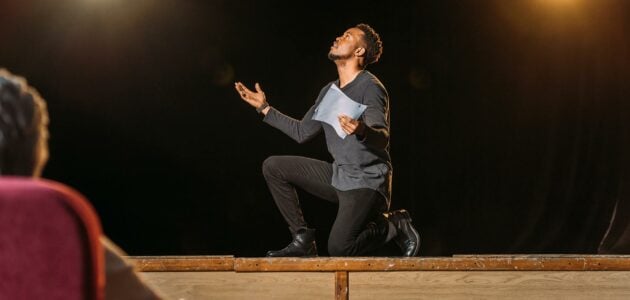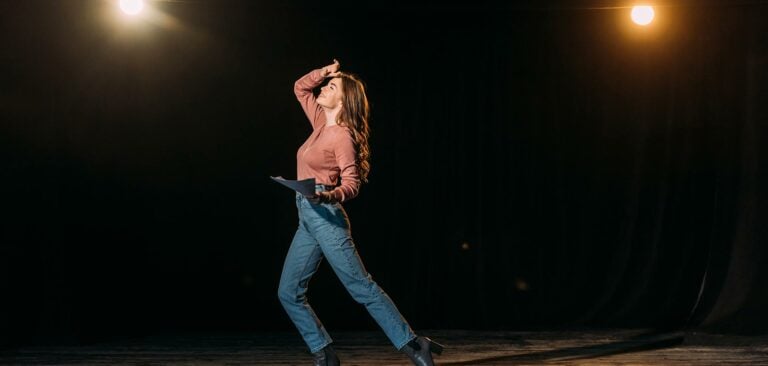
How to Find Depth in an Audition Monologue
Most young actors have been praised throughout high school for their strong character choices. Their ability to create “characters” is what has made them successful in a high school setting. This can often take some dismantling as you try to make the transition into the acting industry. Whether you’re auditioning for drama school or for a TV show, the tricks you were praised for in high school, could be what’s letting you down in auditions.
We recently interviewed Chris Edmund, the former head of acting at the Western Australian Academy of Performing Arts, one of the leading drama schools in the world. Chris has trained hundreds of actors over the years. Some notable students include Hugh Jackman, Frances O’Connor and Jai Courtney. (Interview below)
His approach to acting is simple: find the truth in every scene.
Can you go deeper? Can you as an actor find more truth in every moment of a scene or monologue? Can you simplify?
So here are the steps to finding more depth and truth in your audition monologue…
Step 1: Do less
Acting coaches love the phrase “do less”. This can be a problematic direction as it gives actors the impression that doing less is always the best acting choice; it isn’t. You can be big and bold with your decisions and still be truthful.
However, if you aren’t connecting with the piece, it’s always a good first step to try and “do less”. Can you simplify the monologue? Are you pushing too hard? Are you moving too much? Especially in an audition setting, keeping it simple is always preferable.
Exercise: sitting on your hands.
This might sound a bit silly, but it’s a great exercise to focus your acting work on clarity and simplicity. When we are self conscious we often show it with our physicality. That might be in the form of over-gesturing, or a rigid stillness.
Try running through your monologue whilst sitting on both hands. Being physically limited will give you some interesting insights. It pushes you to focus on the words and to do less. Reflect on how you feel after the exercise and see if you have any revelations. This exercise is great for Shakespeare monologues.
Read: Preparing a Shakespeare Monologue
Step 2: Take it outside yourself
Most monologues fall flat when actors focus on themselves.
I get it. You are on stage on your own, in an audition setting, and it does start to feel like it’s all about you. Probably because it is. That being said, you need to try and get your focus outside of yourself.
If they have an actor in the audition that you can use for your monologue, do it. It really helps to talk to another actor. Monologues can feel unnatural, but they are still a form of relationship, just like a scene. Try to affect the other actor and stop thinking about what you are doing.
Tip: if your monologue is to an audience, the same rules apply. Make the audience the other actor. Have a relationship with the audience. Think about who the audience is and where they’re sitting. The more specific you are the better.
Read: Be in the Moment on Stage
Step 3: Let go of character
I touched on this in the introduction, but I want to go into more detail here. The idea of character is a trap for most actors.
Especially when you are starting out in your acting career, I would try and let go of the notion of character. Character is created by intentions. It is the natural by-product of going after what you want in a scene.
Richard III isn’t “evil” because actors play him “evil”, he appears that way because of what actions he takes, and the tactics he uses to achieve his objective. In fact, you should never play an idea like “evil”. Never judge your character! Character’s are simply going after an objective.
Experiment with pulling back on character and see how the monologue feels when you focus just on the text. Don’t bring a physical or vocal pattern to the monologue, but instead be yourself within the given circumstances of the monologue. Can you do less?
Chris discusses some of these ideas in the video below…
How to Find Depth in an Audition Monologue (Chris Edmund)
Conclusion
If you’ve read my articles in the past you know that I love actors making “bold choices”. By that I mean taking a risk with a scene or monologue. So you might be thinking this article is slightly contradictory, but it isn’t. All acting choices must be based in truth. Though I love bold acting choices, I love truth and connection more. For an early career actor it’s always worthwhile to start simple. For many actors it can be terrifying to do less, but it can also be incredibly powerful.


Leave a Reply